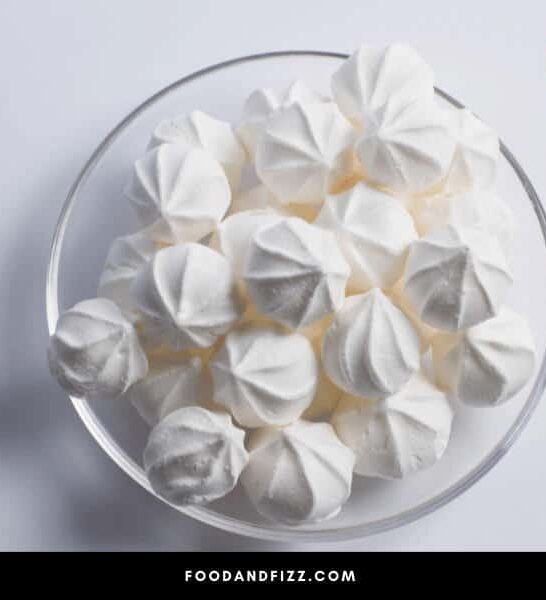Whether you’re making pavlova, cake, or kisses, nothing compares to the shiny white peaks of a perfectly cooked meringue. For many of us, however, this is easier said than done, and all too often, we end up with golden-brown meringues instead.
To combat this, and after much trial and error, I’ve found a way to keep meringues bright and white. Read on to find out more.
How to Stop Meringues Going Brown?
The trick to keeping meringues white is to dry them out rather than cook them. This means keeping them in the oven at a low temperature of around 50F (10C) for many hours (or even overnight). When meringues turn brown, it’s because they’re exposed to too much direct heat too quickly. While perfectly edible, they won’t have the bright, unblemished white color of store-bought meringues.
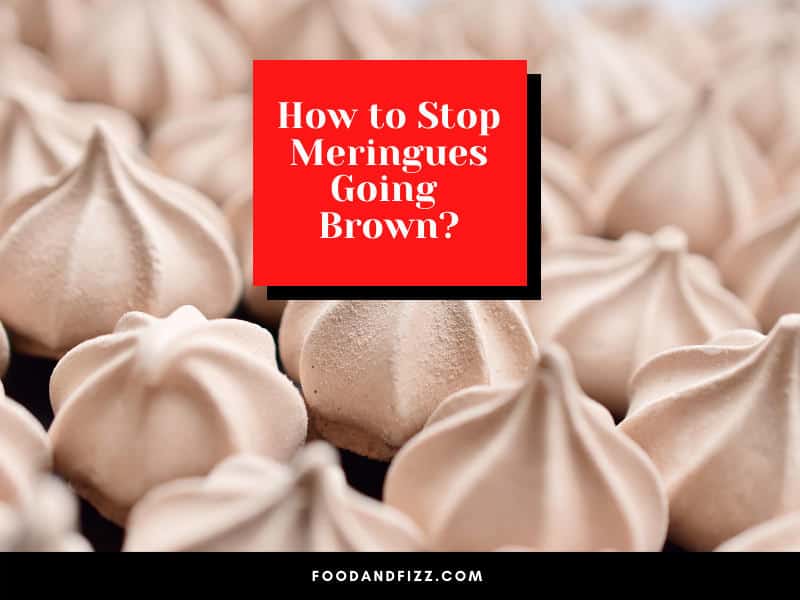
What’s In A Meringue?
If you’ve ever made meringues at home, you know they can be trickier to perfect than they seem in concept.
These fussy treats can flop for any number of reasons, even though they’re comprised of only two or three ingredients.
Traditional meringues are a mix of egg whites and castor sugar and sometimes a splash of vanilla essence.
That being said, the internet is full of advice on how to get your meringues stiffer, shinier, or sweeter by adding extra components like cream of tartar.
Either way, your recipe won’t have that much bearing on their eventual color.
Instead, it’s about how you cook them.
A perfect meringue will be crunchy on the outside and a little soft and marshmallow-like on the inside.
To achieve their signature white coloring, you need to plan ahead, as it can be quite a lengthy process.
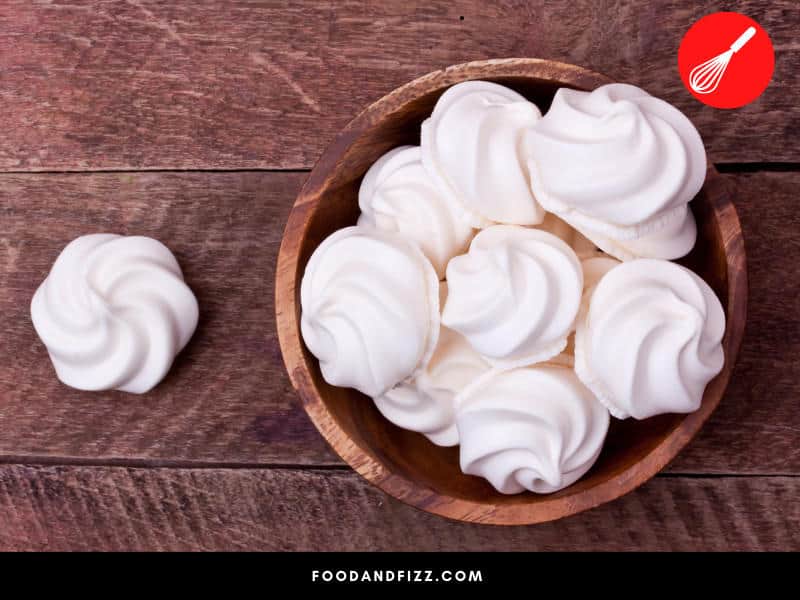
How to Keep Meringues White and Stop Them From Turning Brown
When it comes to making perfectly white meringues, patience is the name of the game.
Most often, when meringues turn brown, it’s because they’re cooking at too high a heat and too quickly.
You don’t actually want to cook them at all but rather dry them out, which takes hours.
This process eradicates all the moisture embedded in them, giving meringues that signature crunch.
It also “cooks” them just enough to ensure the egg white component is safe to store and eat later.
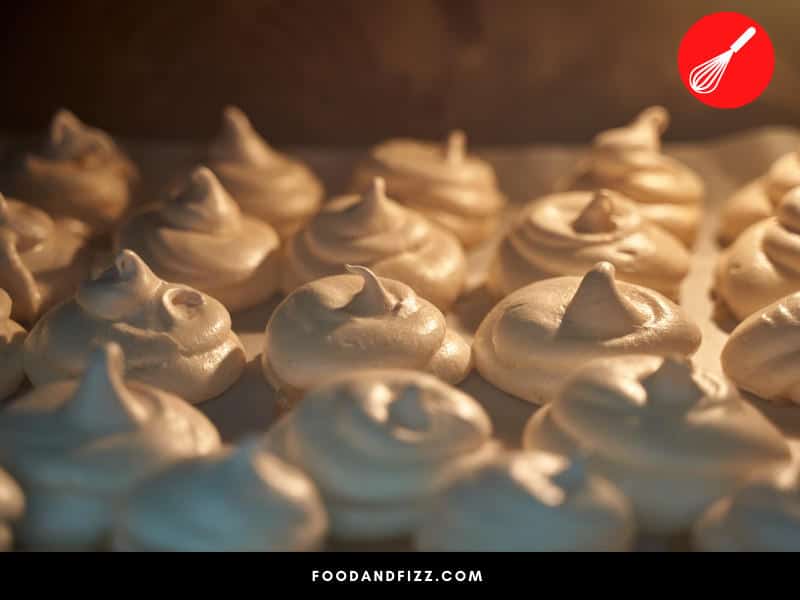
How to Cook Meringues to Keep Them White
To keep meringues white, preheat your oven to its lowest temperature setting.
I recommend 50F (10C) as the optimal setting for this purpose.
You can also use your oven’s warming draw if you have one, which won’t far exceed this temperature.
Once it’s slightly warm, place your tray of meringues in the center of the oven to ensure they dry evenly.
Then, leave them for most of the day or night to dry.
As they’ll stay white, it can be difficult to tell when they’re ready to be served.
An easy way to check is to see if they come away from the baking sheet (or parchment paper) they’re resting on without resistance.
If they’re still sticking, they need to stay in the oven longer.
How Do I Know if My Oven is Too Hot for My Meringues?
If your meringues start to form tiny beads of condensation, it means they’re baking rather than drying.
In other words, your oven may be too hot.
Another more obvious way to tell if your heat setting is too high is if your meringues start to turn golden brown.
While not make-or-break, this is not the desired outcome for most meringue enthusiasts, who prefer their treats to be white.
To prevent browning, remove your meringues from the oven, lower the heat setting, and return them once it’s cooled a bit.
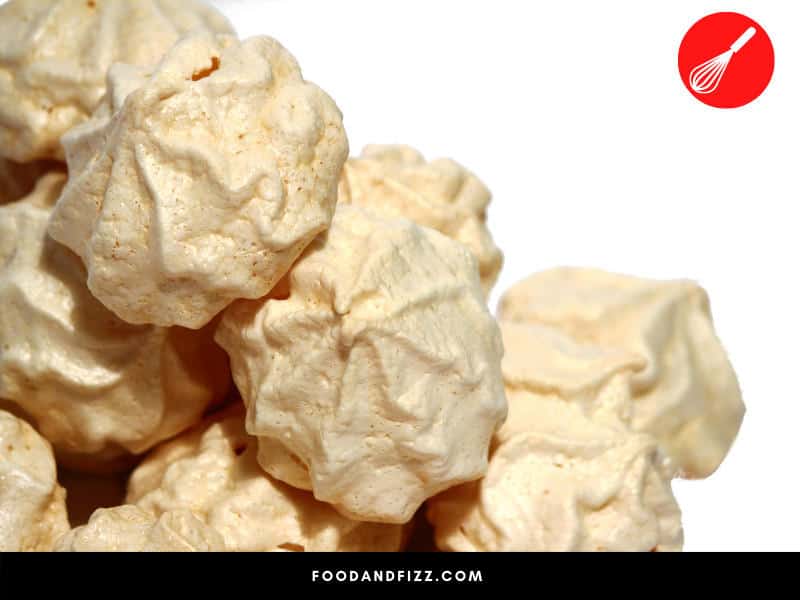
More Tips and Tricks for Making Perfect Meringues
As mentioned, meringues can be fussy.
Over time, I’ve developed some tips and tricks to make sure I get them perfect every time.
It starts from when I prep them.
If you have any experience with meringues, you’ll know that you need to have a spotless bowl and mixer, or else your egg whites won’t stiffen up.
For the same reason, I always separate my egg yolks one by one to make sure no yellow creeps in.
When it comes to adding the sugar, do it slowly, as the fluffy egg whites can only handle so much density at a time.
Cream of tartar gives them a little extra shine and helps keep their form.
As for the drying process, it can be time-consuming, so I always bake my meringues in bulk.
Pavlova shells and nests take longer than small meringue kisses, so plan in advance if you want to make that kind of dessert.
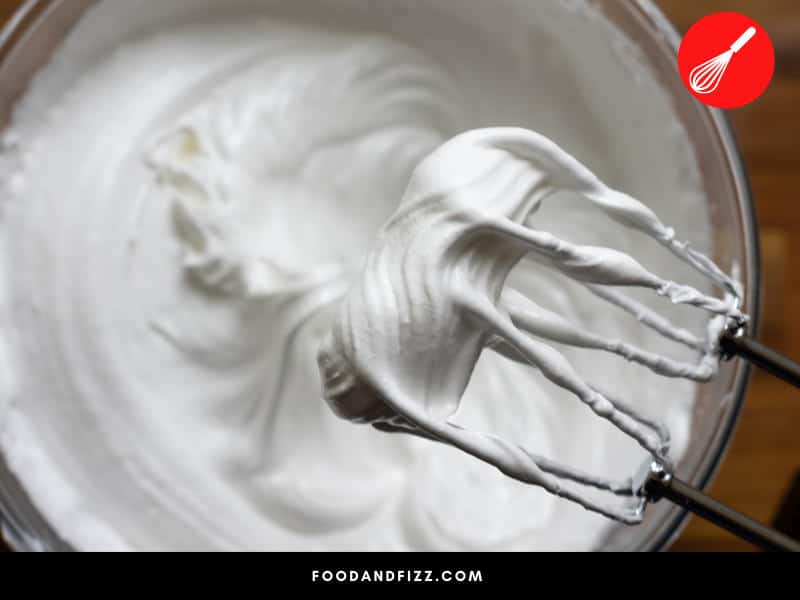
Conclusion to How To Stop Meringues Going Brown?
Meringues are beloved the world over as an indulgent treat, and because of their limited ingredients, they’re fun to make at home. However, it’s easy to be bowled over by our enthusiasm to have them ready as quickly as possible, which is why we so often overbake them.
Perfect, bright white meringues are well within your reach if you practice a little patience. In no time, you’ll be serving up enviably delicious treats that are nothing short of pristine.
Frequently Asked Questions on How to Stop Meringues Going Brown?
Are There Different Types of Meringue?
There are three different types of meringue, Swiss, Italian, and French. They all have sugar and egg white as their base ingredients but are made using different techniques. French meringues are the easy-to-make whipped and dried recipe most of us are used to. Swiss meringues are made using heat over a double boiler. And Italian meringues are made with sugar syrup.
How Long Should I Whisk My Meringue Mixture?
Meringues should be whisked until they form stiff peaks. Start on a low setting and beat them for about one minute. Increase the speed of the mixture for a further two to three minutes until the mixture is stiff. Depending on your mixer, this can take slightly longer or shorter, but it is a reasonable rough estimate.

